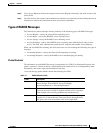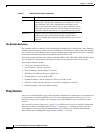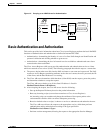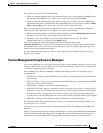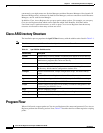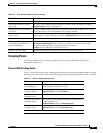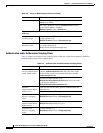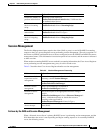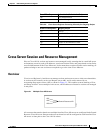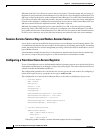
2-5
Cisco Access Registrar 3.5 Concepts and Reference Guide
OL-2683-02
Chapter 2 Understanding Cisco Access Registrar
Program Flow
Scripting Points
Cisco Access Registrar lets you invoke scripts you can use to affect the Request, Response, or
Environment dictionaries.
Client or NAS Scripting Points
Table 2-3 shows the location of the scripting points within the section that determines whether to accept
the request from the client or NAS. Note, the scripting points are indicated with the asterisk (*) symbol.
Table 2-2 From Access-Request to Access-Accept
Cisco AR Server Action Explanation
Receives an Access-Request The Cisco Access Registrar server receives an Access-Request packet from a NAS
Determines whether to accept
the request
The Cisco Access Registrar server checks to see if the client’s IP address is listed in
/Radius/Clients/<Name>/<IPAddress>
Invokes the policy SelectPolicy
if it exists
The Cisco ARPolicy Engine provides an interface to define and configure a policy and
to apply the policy to the corresponding access-request packets
Performs authentication and/or
authorization
Directs the request to the appropriate service, which then performs authentication and/or
authorization according to the type specified in /Radius/Services/<Name>/<Type>
Performs session management Directs the request to the appropriate Session Manager
Performs resource management
for each Resource Manager in
the SessionManager
Directs the request to the appropriate resource manager listed in
/Radius/SessionManagers/<Name>/<ResourceManagers>/<Name>, which then
allocates or checks the resource according to the type listed in
/Radius/<ResourceManagers>/<Name>/<Type>
Sends an Access-Accept Creates and formats the response, and sends it back to the client (NAS)
Table 2-3 Client or NAS Scripting Points
Action Explanation
Receives an
Access-Request.
The Cisco Access Registrar RADIUS server receives an
Access-Request packet from a NAS.
Determines whether to
accept the request.
The client’s IP address listed in
/Radius/Clients/<Name>/IPAddress.
*Executes the server’s
incoming script.
A script referred to in /Radius/IncomingScript.
*Executes the vendor’s
incoming script.
The vendor listed in /Radius/Clients/Name/Vendor, and is
a script referred to in
/Radius/Vendors/<Name>/IncomingScript.
*Executes the client’s
incoming script.
A script referred to in
/Radius/Clients/<Name>/IncomingScript.
Determines whether to accept requests from this specific NAS.



